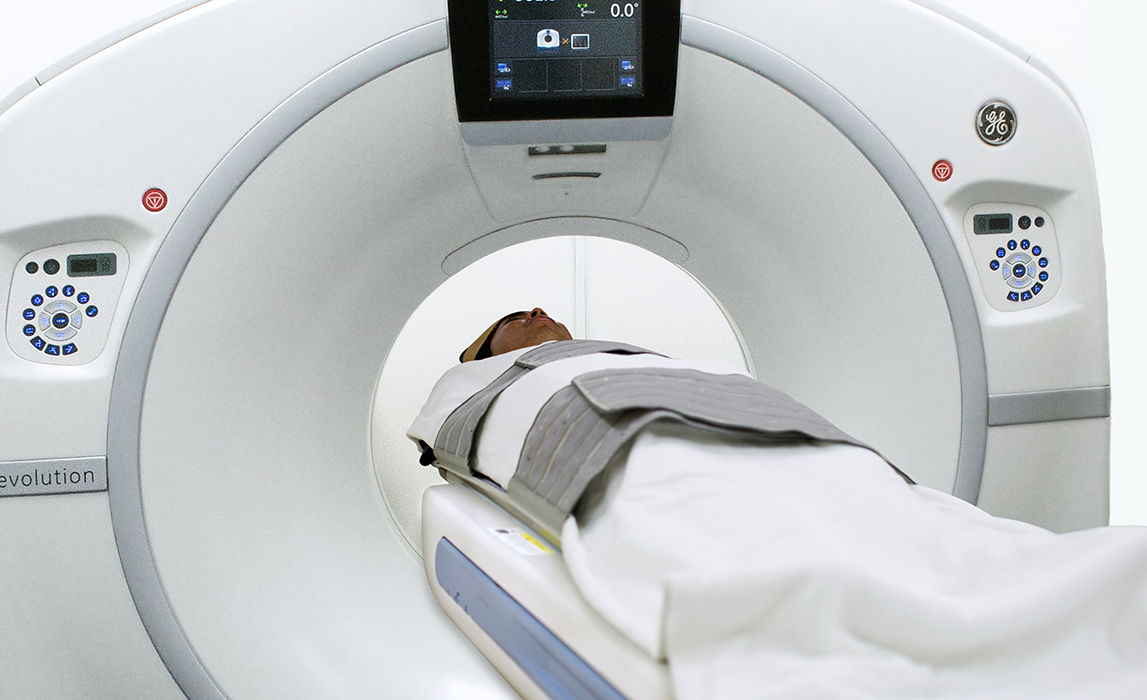Low-Dose CT Lung Cancer Screening
Approximate time to complete program: 30- 60 minutes
- Comprehensive Medical History
- Consultation and assessment
- Vital Sign: Height | Weight | Blood Pressure| BMI
- CT scan (Low dose Lung CT scan)
- Medical report

What is a Low Dose CT scan?
Low-dose CT scan (LDCT scan) is a computed tomography imaging using low-dose radiation. It differs from the standard CT scan by using a much lower dose of ionized radiation to produce images. Patients do not have to worry that they are overexposed to radiation. Modern scanners, such as the ones installed at Family Medical Practice, offer ultra-low-dose radiation CT scans without compromising the image quality. It is a painless and noninvasive screening test that only takes minutes to complete.
Low-dose CT scan for lung cancer screening takes multiple chest images while the patients lie flat on the X-ray table. The images are combined to reconstruct detailed internal organ images, highlighting the lungs. Due to the high image qualities, the scan can detect a small lung nodule or early stages of lung cancer. If lung cancer is caught before it spreads, the likelihood of surviving 5 years or more improves to 60 percent.
Talk to your doctor about whether or not you are eligible for lung cancer screening.
The first step is finding out if you meet the high-risk criteria for screening. The criteria are based on your age, smoking history, and additional risk factors. It is important to remember that your doctor does not necessarily think you have cancer if they suggest a screening test.
Candidate for annual Low-dose CT Lung Cancer Screening
The American Cancer Society recommends annual lung cancer screening as follows:
High-risk group:
These organizations recommend yearly lung cancer screening with LDCT scans for people who:
- Are 50 to 80 years old and in fairly good health,
and - Currently smoke or have quit in the past 15 years,
and - Have at least a 20 pack-year smoking history. (This is the number of packs of cigarettes per day multiplied by the number of years smoked. For example, someone who smoked 2 packs a day for 10 years [2 x 10 = 20] has 20 pack-years of smoking, as does a person who smoked 1 pack a day for 20 years [1 x 20 = 20].)
Other-risk group:
Screening is also recommended for people who:
- Secondhand smoke exposure
- Those exposed to radioactive radon gas or radiation
- Exposure to PM 2.5 particles and air pollution for an extended time.
- Those with a family history of lung cancer.

The procedure of the Low-dose CT scan
Before the procedure
It is easy to prepare for an LDCT scan. Be sure to tell your doctor if you have a respiratory infection as that might affect the results and an LDCT scan should not be completed if you are sick. You will be asked to remove any metal you are wearing, like jewelry, watches, etc. And if you are or think you may be pregnant, inform the radiologist right away.
Contrast injection is not necessary for an LDCT lung cancer scan.
During the procedure
The scan itself is painless and quick, less than a minute. You will lie down on the table of the machine. It will slide in and out of the scanner while you lie as still as possible. You may be asked to hold your breath. The technologist who runs the scan will talk you through the whole process.
After the procedure
The radiologist will send the result to your doctor, who will discuss it with you.
- A positive result means an abnormality or nodule is detected. Your doctor may order additional tests to plan appropriate treatment.
- A negative result means no abnormality is detected. Your doctor may advise you to have an annual screening, depending on your medical history and symptoms.
- Indeterminate means the result is not definite, and you may need another scan later.
LDCT screening can detect small lung nodules that may not be visible on a standard chest X-ray. This diagnostic imaging has been shown to reduce mortality by detecting lung cancers at an earlier stage when they are more treatable.
If you would like to make a booking or request more information, please click here or call 028 3514 0757 or email us at care1@vietnammedicalpractice.com

 본 웹사이트는 사용자 경험을 향상을 위해 쿠키를 사용하고 있습니다.
본 웹사이트는 사용자 경험을 향상을 위해 쿠키를 사용하고 있습니다.